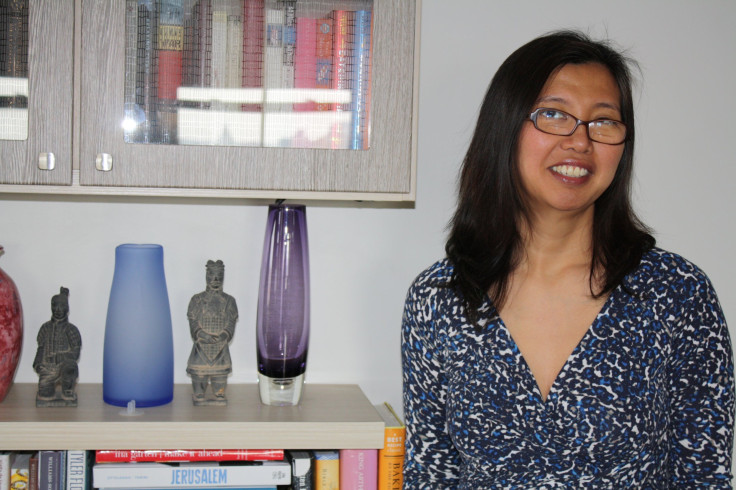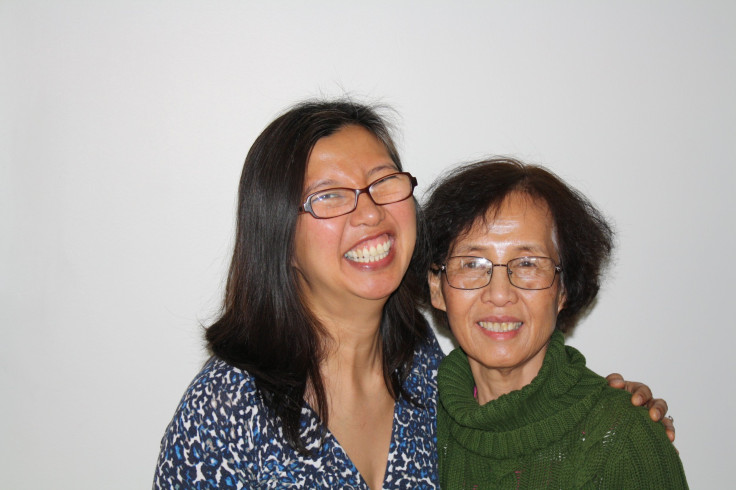One Story: How The Challenge Of Colon Cancer Stage 4 Is Making Julie Yip-Williams Better, Smarter, Kinder

“I really believe every challenge in your life,” Julie Yip-Williams pauses for emphasis, “is about making you better than who you were before the challenge. Making you smarter, making you more empathetic, making you kinder, making you wiser — making your soul more nuanced and complex and rich.”
Yip-Williams, 39 years old, is sitting in the family room of her apartment, which overlooks Atlantic Terminal in Brooklyn. She is an animated woman, gesturing from her couch as sunlight streams through the 9th floor window and gleams off the polished surfaces of tables and bookcases, the nearby appliances in an open-plan kitchen. Most of what she speaks of is dark, still she laughs frequently and smiles vividly. Though not a petite woman, she appears vulnerable.
She has had two great challenges in her life, Yip-Williams says, and both have been medical. The first crisis occurred at birth — she was born blind. Though her condition, congenital cataracts, was corrected with a series of childhood surgeries performed at a UCLA hospital, she was considered legally blind, and so in the earliest years of her education, she attended special schools for handicapped kids. Eventually mainstreamed, she began to attend regular schools where she “became kind of a nerd” and after graduation, enrolled in Williams College, where she studied History and Asian Studies. Upon completion of these studies, she entered law school... Harvard Law School.
And so a life which so easily might have been stunted and impoverished blossomed with rich opportunity. Making the most of her gifts, Yip-Williams has enjoyed a corporate law career along with the joys of marriage and motherhood. Fate abruptly changed course just 18 months ago, when Yip-Williams flew with her husband and two daughters to LA for a family wedding. There, in the sunny California warmth, she experienced a sudden and wrenching pain. Attending the wedding as planned was clearly impossible.
“I ended up in this podunk hospital in my parents’ hometown [in California] and that’s where they did the CAT scan and colonoscopy,” Yip-Williams explains. The tests showed an obstruction in her colon and so the hospital staff immediately admitted her, but she had misgivings: “I will not have surgery here,” she thought at the time, “I will die if I have surgery here.” Scrambling, Yip-Williams made calls from her hospital bed until she found a colorectal surgeon at UCLA and transferred to the university hospital where she’d once had her eye surgery. “I went back to the place where I felt I had been given life in the first place,” she says.
And so she began the second greatest challenge of her life.
Personal History
Yip-Williams’s understanding of the word "challenge" would strike many as strangely modest, given the circumstance of her life. Born in Vietnam to a Chinese family in January of 1976, she entered the world shortly after the fall of Saigon, the unofficial end of the Vietnam War, a guerilla conflict involving anti-communist and American forces. Ravaged by war, the country was impoverished, destitute, so the Vietnamese government officially "invited" all the people of ethnic Chinese ancestry to leave. "It was sort of a purge," Yip-Williams explains, "but you had to be able to pay your way to get out." Her family, which she describes as Merchant-class, had money hidden, so they paid their gold to escape.
It was, in Yip-Williams's words, “your usual crazy, desperate boat escape. We ended up in Hong Kong and stayed in a refugee camp there.” From there, they eventually journeyed to San Francisco and finally made their way to LA.
For Yip-Williams, the harrowing escape, the time in a camp, and the eventual relocation to America was the best of good fortunes. Her mother had always wanted to find some treatment for her blind daughter. “It was my mother’s dream to come to America to have my vision fixed,” Yip-Williams says. “She didn't know, she just had some hope that somebody could fix me.” This maternal faith found its just rewards in the city of angels. “We ended up at UCLA, one of the finest eye institutes in the world,” Yip-Williams explains, and there doctors performed their miraculous surgeries and removed the obstruction in her eyes. Born blind, she now could see.

Colon Cancer
In past decades, colorectal cancers have been thought of as "an old man’s disease," since they more than anyone are most likely to be diagnosed with malignant tumors appearing in the colon or rectum. Today, though, this cancer is increasing in people under age 40 at a rate of two to three percent each year. In families genetically disposed to the disease — where multiple generations are diagnosed — it has begun to manifest earlier and earlier.
“So if the grandfather gets it at 85, the son is getting it at 50, and the next generation’s getting it at 40,” says Yip-Williams, who believes all signs point to some environmental cause. Having been diagnosed as stage 4, which has an 11 percent survival rate, she believes she will die of the disease and so she often wonders why she got cancer “in the greater scheme of things.”
“When I had cancer, when I was diagnosed, I said to the gods — I’m not really religious — so I said, OK, what is the universe trying to teach me? What am I supposed to learn from this? What am I supposed to do with this? What is it all —” Yip-Williams pauses and does not finish her sentence. When she resumes, she says in a quiet voice that she believes there is great value in suffering, that strength and goodness come from challenge and pain. "I do think that life is about the journey of the soul," she says.
Naturally, as a mother, Yip-Williams is concerned for her daughters, ages 5 and 3, and the impact her disease is having on their lives. Possibly, Mia and Isabelle face a genetic pre-disposition to colon cancer, so, as the current protocol dictates, they will have to begin screening at age 27, which is 10 years before she herself was diagnosed. Though this worries her, Yip-Williams believes there will be a cure by then and she is working to raise funds to that end.
At the same time, she is realistic about the odds against her and so she frequently reflects on how, if she dies, it would affect her girls. "I need to believe that it will make them more resilient," Yip-Williams says. "It will be the first, most difficult challenge in their life."
Despite such positive hopes, cruel circumstance has transformed her as a mother nevertheless. On the one hand, she is trying to be very practical and so she has begun a home renovation project. “I wanted a place for my husband and [my daughters] to be comfortable in if I wasn’t here,” Yip-Williams explains. “And now I’m going to redo their bedroom because it’s a baby room and I want to make sure it’s a space that they can grow into maybe even into their teenage years.”
At the same time she is trying to impart to her daughters all the wisdom, knowledge, and memories her life contains so that they “really understand how their mother thought and felt, and how she approached life.” She wants to embolden them to live as well as she has; she wants them to travel, to taste different foods, to speak different languages. And so she posts to her blog and thinks about beginning a memoir, but mostly, she talks.
“I have these conversations with them that they’re probably not ready to have,” says Yip-Williams, who then describes how one traditional Chinese Tiger Mom has softened. “I will tolerate certain things which I would never tolerate before I had cancer. Like, I let my little one climb into bed with me and sleep with me… now it’s like, ‘maybe she really needs this.’” And so she spends her time unspooling the past and weaving the threads into simple stories so little Isabelle and Mia might see the dark, wise, rich, nuanced, and oh-so-glorious tapestry that is their mother's life.
Part 1 in a Series of 3



























